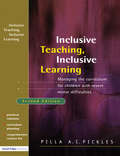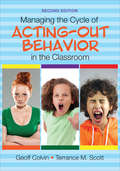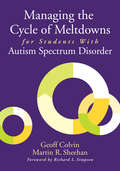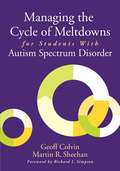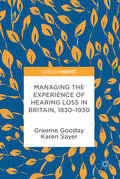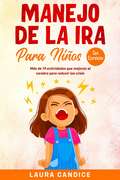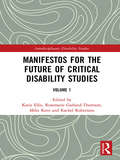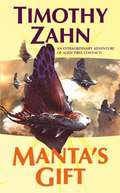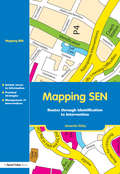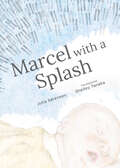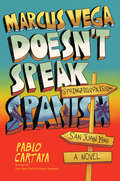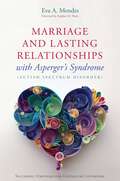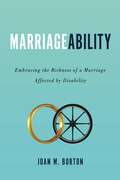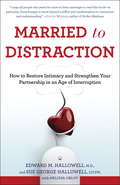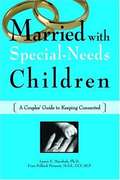- Table View
- List View
Managing the Assistive Technology Process: The Nontech Guide for Disability Service Providers
by James BaileyThis book focuses on the management of Assistive Technology in higher education. It written for a target audience of Disability Service Coordinators in college settings.
Managing the Curriculum for Children with Severe Motor Difficulties: A Practical Approach
by Pilla PicklesThis is a practical and imaginative guide to the management and education of children with severe motor difficulties. It is particularly useful for mainstream schools and also special schools and children at home.
Managing the Cycle of Acting-Out Behavior in the Classroom
by Terrance M. Scott Geoffrey T. ColvinMinimize problem behavior and maximize student success! Acting-out behavior by students manifests in ways that make classroom management and teaching very challenging. Building on a model using seven phases of acting-out behavior presented in the first edition, the newly updated edition draws on new research in applied behavior analysis, sound instructional principles, and functional behavior assessment to deliver a clear roadmap for educators to design interventions in a clear, systematic, and achievable matter. Features include: Managing each phase of the acting-out cycle—from structuring the classroom, to handling escalated behavior, to recovery Case studies that distill concrete action steps from the book’s concepts Checklists, tools, resources, and templates for applying the book’s principles to any classroom
Managing the Cycle of Acting-Out Behavior in the Classroom
by Terrance M. Scott Geoffrey T. ColvinMinimize problem behavior and maximize student success! Acting-out behavior by students manifests in ways that make classroom management and teaching very challenging. Building on a model using seven phases of acting-out behavior presented in the first edition, the newly updated edition draws on new research in applied behavior analysis, sound instructional principles, and functional behavior assessment to deliver a clear roadmap for educators to design interventions in a clear, systematic, and achievable matter. Features include: Managing each phase of the acting-out cycle—from structuring the classroom, to handling escalated behavior, to recovery Case studies that distill concrete action steps from the book’s concepts Checklists, tools, resources, and templates for applying the book’s principles to any classroom
Managing the Cycle of Meltdowns for Students With Autism Spectrum Disorder
by Martin R. Sheehan Geoffrey T. ColvinHow to keep meltdowns from overheating your classroom This book outlines practical steps for preventing and responding to the various phases of meltdown behavior in students with ASD. Based on Geoff Colvin’s best-selling book, Managing the Cycle of Acting Out Behavior in the Classroom, this practitioner-friendly guide provides special and general education teachers with his seven-phase positive behavior support model that includes interventions for each phase. Readers will also find: An overview of the nature of autism and meltdown phases Case studies with examples of behaviors and plans A chapter on parent communication Prevention techniques for the early stages of the cycle
Managing the Cycle of Meltdowns for Students with Autism Spectrum Disorder
by Geoff Colvin Martin R. SheehanBased on Geoff Colvin's bestselling book, Managing the Cycle of Acting-Out Behavior in the Classroom, this practitioner-friendly guide provides special and general education teachers of autistic students with a six-phase positive behavior support model that includes interventions for each phase. Outlining practical steps for preventing and responding to the various phases of meltdown behavior in students with autism spectrum disorder, you'll find: An overview of ASD Examples of meltdown behavior Common triggers Addressing sensory issues Establishing expectations and rules Collaborating with parents And much moreTeachers will find experienced guidance for providing a supportive environment in which students with ASD can succeed.
Managing the Experience of Hearing Loss in Britain, 1830–1930
by Graeme Gooday Karen SayerThis book looks at how hearing loss among adults was experienced, viewed and treated in Britain before the National Health Service. We explore the changing status of ‘hard of hearing’ people during the nineteenth century as categorized among diverse and changing categories of ‘deafness’. Then we explore the advisory literature for managing hearing loss, and techniques for communicating with hearing aids, lip-reading and correspondence networks. From surveying the commercial selling and daily use of hearing aids, we see how adverse developments in eugenics prompted otologists to focus primarily on the prevention of deafness. The final chapter shows how hearing loss among First World War combatants prompted hearing specialists to take a more supportive approach, while it fell to the National Institute for the Deaf, formed in 1924, to defend hard of hearing people against unscrupulous hearing aid vendors. This book is suitable for both academic audiences and the general reading public. All royalties from sale of this book will be given to Action on Hearing Loss and the National Deaf Children’s Society.
Manejo de la ira para niños [con ejercicios]: Más de 19 actividades que mejoran el cerebro para reducir las crisis
by Laura CandiceEste libro inteligente tiene un objetivo claro, que es enseñar la mentalidad y los hábitos correctos que sus clientes deben adoptar en pasos muy simples para construir y mantener una familia iluminada y tener hijos felices sin pérdida de tiempo ni dolores de cabeza.
Mangold Basic Braille Program: Tactile Perception and Braille Letter Recognition
by Sally MangoldTeacher manual for braille instruction.
Mangold Braille Program Basic Nemeth Teacher’s Manual - Introduction
by Sally MangoldTeacher manual for braille instruction.
Mangold Braille Program Basic Nemeth Teacher’s Manual – Unit Instructions
by Sally MangoldTeacher manual for braille instruction.
Mangold Developmental Program of Tactile Perception and Braille Letter Recognition
by Sally MangoldTeacher manuals for braille instruction.
Manifestos for the Future of Critical Disability Studies: Volume 1 (Interdisciplinary Disability Studies)
by Rosemarie Garland-Thomson Rachel Robertson Katie Ellis Mike KentThis collection identifies the key tensions and conflicts being debated within the field of critical disability studies and provides both an outline of the field in its current form and offers manifestos for its future direction. Traversing a number of disciplines from science and technology studies to maternal studies, the collection offers a transdisciplinary vision for the future of critical disability studies. Some common thematic concerns emerge across the book such as digital futures, the usefulness of anger, creativity, family as disability allies, intersectionality, ethics, eugenics, accessibility and interdisciplinarity. However, the contributors who write as either disabled people or allies do not proceed from a singular approach to disability, often reflecting different or even opposing positions on these issues. Containing contributions from established and new voices in disability studies outlining their own manifesto for the future of the field, this book will be of interest to all scholars and students working within the fields of disability studies, cultural studies, sociology, law, history and education. The concerns introduced here are further explored in its sister volume Interdisciplinary approaches to disability: looking towards the future.
Manta's Gift
by Timothy ZahnI am not a fan of science fiction, but I have to admit that this is a clever, creative and well-crafted novel. My favorite review: What if James Dean were a twin-tailed manta ray swimming in Jupiter's atmosphere? Bestselling Star Wars novelist Zahn (Angelmass) gives us a tale of teen coming-of-age angst set in the herd society of the Qanska, intelligent herbivores who inhabit the equatorial band of the gas giant. Suspecting them to be non-native life, Earth's corporate masters, the Five Hundred, send in a spy to find their hidden star drive. Facing their own disaster, the Qanska agree, hoping to gain a human perspective on the impending exhaustion of their ecology. What neither side can count on is how the person injected into the Qanskan world will react. Matt Raimey, a 22-year-old paralyzed by a skiing accident, agrees to have his brain transplanted into a Qanska fetus. Given a second chance to be mobile, he also unexpectedly gets another chance to mature. Zahn concentrates more on the psychological processes at work than on the technological. Solutions to problems arise from better emotional and intellectual integrity, not simply larger databases. While the author doesn't get as deep into his characters as they do into Jupiter's depths, his portrayal of Matt/Manta is direct and involving. Qanskan life, looking much like marine reef life on Earth, is intriguingly portrayed, even if the biology of the Qanskan problem is suspect. YA readers looking for more than the usual SF action-adventure should be well pleased. (Publisher's Weekly)
Manual for the Stanford Multi Modality Imagery Test
by William L. DautermanThe author's data on the test called "The Stanford Multi-Modality Imagery Test for the Blind" as a part of a research project has been revised in this manual under the name of "The Stanford Multi-Modality Imagery Test."
Mapping SEN: Routes through Identification to Intervention
by Amanda KirbyProviding practical guidance on enhancing learning through ICT in English this book is made up of a series of projects that supplement, augment and extend the QCA ICT scheme and provide much-needed links with Units in other subjects’ schemes of work. It includes: fact cards that support each project and clearly outline its benefits in relation to teaching and learningexamples of how activities work in "real" classroomslinks to research, inspection evidence and background reading to support each projectadaptable planning examples and practical ideas provided on accompanying downloadable resources.Suitable for all trainee and practising primary teachers.
Marcel with a Splash
by Julia SørensenMarcel was born with webbed toes and an extra chromosome in this tender exploration of a child’s life with Down syndrome. When Marcel is born, the first thing the midwife notices is his webbed toes. Otherwise, he eats, he sleeps, he eats again, just like any baby. And then the doctors start to notice Marcel’s almond-shaped eyes, weak muscle tone and unusually shaped ears. They come to a conclusion: Marcel has Down syndrome. Marcel’s parents don’t know what to do with this medical terminology, so they bury it in the bottom of the garden, where it can grow in its own time and they can keep an eye on it. But Marcel doesn’t care about words yet. He grows and learns, taking to life like a fish in water. In many ways, Marcel is just like any child. He loves to laugh, be silly with his friends and go swimming during summer vacation. Marcel with a Splash goes beyond medical terms and the accompanying prejudices to discover Marcel himself. Inspired in part by her experiences as the mother of a child with Down syndrome, artist and author Julia Sørensen takes us on a poetic stroll between naps, chromosomes and tall grass, through Marcel’s beautiful, ordinary life. Key Text Features illustrations Correlates to the Common Core States Standards in English Language Arts: CCSS.ELA-LITERACY.RL.K.4 Ask and answer questions about unknown words in a text. CCSS.ELA-LITERACY.RL.K.7 With prompting and support, describe the relationship between illustrations and the story in which they appear (e.g., what moment in a story an illustration depicts). CCSS.ELA-LITERACY.RL.1.1 Ask and answer questions about key details in a text.
Marcelo in the Real World
by Francisco X. StorkThis summer, Arturo Sandoval declares, his son Marcelo will learn about the real world. He will work in the mail room of Arturo's law firm. He will interact with everyone in the office. He will be normal, as Arturo has always said he is, and not have a highly functioning form of Asperger's Syndrome, as Marcelo knows he does. And Marcelo, reluctantly, must agree to his father's terms. He soon learns reality isn't easy. Wendell, the son of Arturo's partner, offers friendship to further his own ends. The law firm hides an injustice that will transform Marcelo's world. But through it all, there is Jasmine, his beautiful and tenacious coworker, his true friend -- ...and perhaps more. <P><P> Winner of the Schneider Family Book Award
Marcus Vega Doesn't Speak Spanish
by Pablo CartayaOne boy's search for his father leads him to Puerto Rico in this moving middle grade novel, for fans of Ghost and See You in the Cosmos. <P><P>Marcus Vega is six feet tall, 180 pounds, and the owner of a premature mustache. When you look like this and you're only in the eighth grade, you're both a threat and a target. <P><P>After a fight at school leaves Marcus facing suspension, Marcus's mom decides it's time for a change of environment. She takes Marcus and his younger brother to Puerto Rico to spend a week with relatives they don't remember or have never met. <P><P>But Marcus can't focus knowing that his father--who walked out of their lives ten years ago--is somewhere on the island. <P><P>So begins Marcus's incredible journey, a series of misadventures that take him all over Puerto Rico in search of his elusive namesake. Marcus doesn't know if he'll ever find his father, but what he ultimately discovers changes his life. And he even learns a bit of Spanish along the way.
Marriage and Lasting Relationships with Asperger's Syndrome (Autism Spectrum Disorder): Successful Strategies for Couples or Counselors
by Stephen M. Shore Eva A. MendesProven counseling strategies that will help improve the relationships of married, long-term or co-habiting couples with Asperger's Syndrome (Autism Spectrum Disorder). ASD relationship expert Eva A. Mendes provides advice straight from the couples' counselling room that can be applied in day-to-day living and help with the challenges that can arise in relationships where one or both partners are on the autism spectrum. This includes issues surrounding diagnosis, mental health, sexual compatibility, sensory needs, executive functioning, theory of mind, communication, and co-parenting. She offers unique practical ideas for positive change such as creating a relationship schedule, making expression of appreciation and gratitude a part of every day, and finding mutually satisfying activities and special interests to engage in with your partner. The strategies in this book will be useful to couples themselves and any couples' counselors or therapists working with them.
Marriage and Lasting Relationships with Asperger's Syndrome (Autism Spectrum Disorder): Successful Strategies for Couples or Counselors
by Eva A. MendesProven counseling strategies that will help improve the relationships of married, long-term or co-habiting couples with Asperger's Syndrome (Autism Spectrum Disorder).ASD relationship expert Eva A. Mendes provides advice straight from the couples' counselling room that can be applied in day-to-day living and help with the challenges that can arise in relationships where one or both partners are on the autism spectrum. This includes issues surrounding diagnosis, mental health, sexual compatibility, sensory needs, executive functioning, theory of mind, communication, and co-parenting. She offers unique practical ideas for positive change such as creating a relationship schedule, making expression of appreciation and gratitude a part of every day, and finding mutually satisfying activities and special interests to engage in with your partner. The strategies in this book will be useful to couples themselves and any couples' counselors or therapists working with them.
MarriageAbility
by Joan M. BortonDisability is relentless. It affects every facet of life. <P><P> Dreams of marriage rarely include wheelchairs, walkers, or medical equipment. Yet the oneness found in a marriage with disability presents a beautiful picture of the relationship between Jesus and His Church. <P><P> This book engages the reality disability puts on the marriage relationship through the real-life, and often humorous, stories of couples living with disability. Readers will find they’re not alone in their journey. They’ll discover a framework to manage the challenges of disability and marriage. <P><P> The book will inspire those who do not live with disability to embrace those around them who do.
Married to Distraction: Restoring Intimacy and Strengthening Your Marriage in an Age of Interruption
by Edward M. Hallowell Sue George Hallowell Melissa OrlovBestselling author and attention deficit expert, Dr. Hallowell teams up with his couples' therapist wife to explain the subtle yet deadly toll a hectic lifestyle takes on intimate relationships. The author offers strategies for restoring connection and communication.
Married with Special-Needs Children: A Couples' Guide to Keeping Connected
by Laura E. Marshak Fran P. PrezantMarried with Special-Needs Children is the first book for parents to examine the stress that is often placed upon a marriage when a couple has a child with a disability. Many parents worry that even strong marriages can buckle--and some may break--under the intense demands of raising a child with special needs. In this practical, supportive guide, the authors draw on their combined professional experience in marital counseling and parent training, and feedback from hundreds of parents of children with disabilities who share their solutions and secrets for a healthy relationship.

